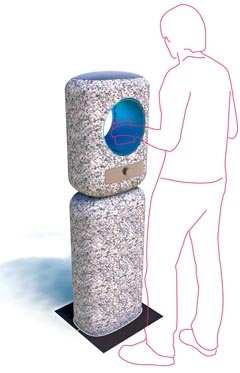Readers projects : Bath Water Holes
A project in Bath aims to replace plastic bottles of water with Dyson-designed re-usable stainless steel flasks filled from DeLank granite fountains produced by Galloway Granite. The first of these new Water Holes is due to be installed this month (May).
By next summer, Bath should have 10 of these new water fountains designed by London firm PearsonLloyd Design and made from Cornish DeLank granite that went all the way to Galloway Granite in Scotland to be manufactured.
As you can see from the pictures, the difficulty of making these sculptural fountains that are called ‘Water Holes’ are the holes themselves – the 300mm diameter hole that goes through the granite from front to back and the only slightly smaller hole coming down from the top.
Core drills this size and the machinery to drive them are not common in the stone industry. Even the well-equipped factory at DeLank quarry could not produce the holes – hence the 700mile detour to Galloway for the stone to be worked on Galloway Granite’s heavyweight Prussiani Energia granite machining centre, followed by hand finishing.
But at least that was a shorter journey than the alternative suggested by most companies in the South of England. Clark Bardsley, the designer of the Water Holes at PearsonLloyd, told NSS: “We struggled to get anyone to work a local granite. Only a couple were willing to help at all, in fact, and they were intent on doing it in China. Hopefully we can afford to continue to use Galloway and DeLank for the remaining nine Water Holes.”
John McKenzie, who runs Galloway Granite, says the first Water Hole took quite a few hours to produce. There was some quite complex geometry to work out so the water could get up to the fountain head, but now they have worked out how best to produce them, making more would be easier. They have been budgeted at £4,000 each.
The water from the fountains will not be the spring water that has been appreciated in Bath since Roman times but tap water, although Clark Bardsley says the poetry of the idea of water coming out of the ground into the fountains remains.
It was a group called Love Tap Water that was behind the project, collaborating with another charity, Alternative Source, although it was Bath & North East Somerset Council that commissioned PearsonLloyd, who had worked with the council on other projects, to design the fountains.
Love Tap Water was established by three women from Bath who wanted to see an alternative to water in plastic bottles sourced from anywhere in the world. They felt there should be publically accessible, hygienic water freely available in Bath. One of their aims was to get rid of the eyesore and pollution of carelessly discarded plastic bottles.
They have gained the support of James Dyson, the inventor of the cyclone vacuum cleaner that bears his name, who lives in the area. He has designed stainless steel flasks that can be filled at the Water Holes. The flasks will be sold in Bath at about £10 each and are intended to be retained and re-used.
Wessex Water needs to be involved to connect the fountains to the mains water supply. It says that bottled water typically costs about 140 times more than mains water.
It is hoped the first of the Water Holes will be installed before the end of this month (May) at St James’s Rampire near the City of Bath College.
Returning public drinking fountains to the urban landscape could be a trend. The project in Bath follows a campaign in Bristol to get its fountains back into action. There, a local woman, Katie Alcott, ran an online ‘Turn Me On’ campaign, inviting people to submit photographs of disused fountains. She, too, wants people to refill containers rather than buying bottled water.

